
Pennsylvania, officially the Commonwealth of Pennsylvania, is a state spanning the Mid-Atlantic, Northeastern, Appalachian, and Great Lakes regions of the United States. Pennsylvania borders Delaware to its southeast, Maryland to its south, West Virginia to its southwest, Ohio to its west, Lake Erie and New York to its north, the Delaware River and New Jersey to its east, and the Canadian province of Ontario to its northwest.

Thomas McKean was an American lawyer, politician, and Founding Father. During the American Revolution, he was a Delaware delegate to the Continental Congress in Philadelphia, where he signed the Continental Association, the Declaration of Independence, and the Articles of Confederation. McKean served as a President of Congress.

The Continental Congress was a series of legislative bodies, with some executive function, for the thirteen colonies of Great Britain in North America, and the newly declared United States before, during, and after the American Revolutionary War. The Continental Congress refers to both the First and Second Congresses of 1774–1781 and at the time, also described the Congress of the Confederation of 1781–1789. The Confederation Congress operated as the first federal government until being replaced following ratification of the U.S. Constitution. Until 1785, the Congress met predominantly at what is today Independence Hall in Philadelphia, though it was relocated temporarily on several occasions during the Revolutionary War and the fall of Philadelphia.
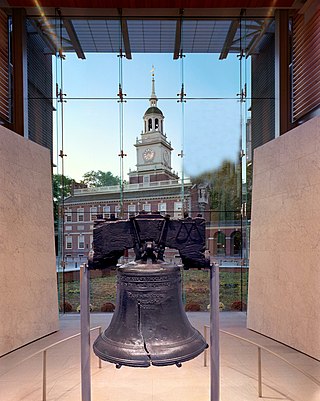
Philadelphia, commonly referred to as Philly, is the most populous city in the U.S. state of Pennsylvania and the second-most populous city in the Northeast megalopolis and Mid-Atlantic regions after New York City. Philadelphia is known for its extensive contributions to United States history, especially the American Revolution, and served as the nation's capital until 1800. It maintains contemporary influence in business and industry, culture, sports, and music. Philadelphia is the nation's sixth-most populous city with a population of 1,603,797 as of the 2020 census and is the urban core of the larger Delaware Valley, the nation's seventh-largest and one of the world's largest metropolitan regions consisting of 6.245 million residents in the metropolitan statistical area and 7.366 million residents in its combined statistical area.
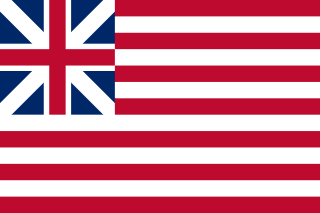
As a result of the American Revolution, the thirteen British colonies emerged as a newly independent nation, the United States of America, between 1776 and 1789. Fighting in the American Revolutionary War started between colonial militias and the British Army in 1775. The Second Continental Congress issued the Declaration of Independence on July 4, 1776. The Articles of Confederation were ratified in 1781 to form the Congress of the Confederation. Under the leadership of General George Washington, the Continental Army and Navy defeated the British military, securing the independence of the thirteen colonies. The Confederation period continued until 1789, when the states replaced the Articles of Confederation with the Constitution of the United States, which remains the fundamental governing law of the United States.

Robert Morris Jr. was an English-American merchant and a Founding Father of the United States. He served as a member of the Pennsylvania legislature, the Second Continental Congress, and the United States Senate, and he was a signer of the Declaration of Independence, the Articles of Confederation, and the United States Constitution. From 1781 to 1784, he served as the Superintendent of Finance of the United States, becoming known as the "Financier of the Revolution." Along with Alexander Hamilton and Albert Gallatin, he is widely regarded as one of the founders of the financial system of the United States.
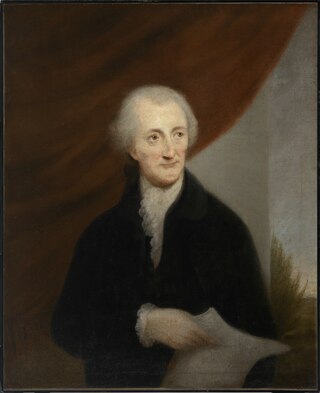
George Read was an American politician from New Castle in New Castle County, Delaware. He was a Continental Congressman from Delaware, a delegate to the U.S. Constitutional Convention of 1787, president of Delaware, and a member of the Federalist Party. In addition, Read served as U.S. Senator from Delaware and chief justice of Delaware.

The city of Philadelphia was founded in 1682 by William Penn in the English Crown Province of Pennsylvania between the Delaware and Schuylkill rivers. Before then, the area was inhabited by the Lenape people. Philadelphia quickly grew into an important colonial city and during the American Revolution was the site of the First and Second Continental Congresses. After the Revolution the city was chosen to be the temporary capital of the United States. At the beginning of the 19th century, the federal and state governments left Philadelphia, but the city remained the cultural and financial center of the country. Philadelphia became one of the first U.S. industrial centers and the city contained a variety of industries, the largest being textiles.
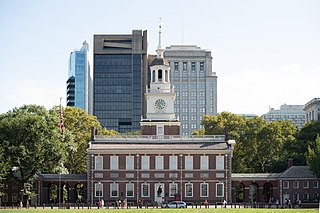
Independence Hall is a historic civic building in Philadelphia, where both the United States Declaration of Independence and the United States Constitution were debated and adopted by America's Founding Fathers. The structure forms the centerpiece of the Independence National Historical Park. Independence Hall was named to the National Register of Historic Places in 1966 and as a World Heritage Site in 1979.

The Province of Pennsylvania, also known as the Pennsylvania Colony, was a British North American colony founded by William Penn, who received the land through a grant from Charles II of England in 1681. The name Pennsylvania was derived from "Penn's Woods", referring to William's father Admiral Sir William Penn.

John Dickinson, a Founding Father of the United States, was an attorney and politician from Philadelphia, Pennsylvania, and Wilmington, Delaware. Dickinson was known as the "Penman of the Revolution" for his twelve Letters from a Farmer in Pennsylvania, published individually in 1767 and 1768, and he also wrote "The Liberty Song" in 1768.

Christ Church Burial Ground in Philadelphia is an important early-American cemetery. It is the final resting place of Benjamin Franklin and his wife, Deborah. Four other signers of the Declaration of Independence are buried here, Benjamin Rush, Francis Hopkinson, Joseph Hewes, and George Ross. Two additional signers of the Declaration of Independence, James Wilson and Robert Morris, are buried at Christ Church just a few blocks away.

The Pennsylvania Navy served as the naval force of Pennsylvania during the American Revolution and afterward, until the formation of the United States Navy. The navy's vessels served almost exclusively on the Delaware River, and were active in first defending the approaches to the city of Philadelphia during the British campaign that successfully occupied the city in 1777, and then preventing the Royal Navy from resupplying the occupying army.
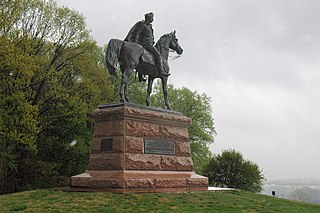
The Philadelphia campaign (1777–1778) was a British military campaign during the American Revolutionary War designed to gain control of Philadelphia, the Revolutionary-era capital where the Second Continental Congress convened and formed the Continental Army and appointed George Washington as its commander in 1775, and authored and unanimously adopted the Declaration of Independence the following year, on July 4, 1776, which formalized and escalated the war.
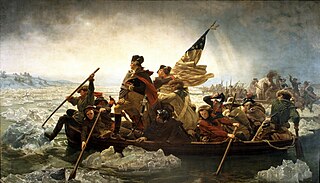
Pennsylvania was the site of many key events associated with the American Revolution and American Revolutionary War. The city of Philadelphia, then capital of the Thirteen Colonies and the largest city in the colonies, was a gathering place for the Founding Fathers who discussed, debated, developed, and ultimately implemented many of the acts, including signing the Declaration of Independence, that inspired and launched the revolution and the quest for independence from the British Empire.
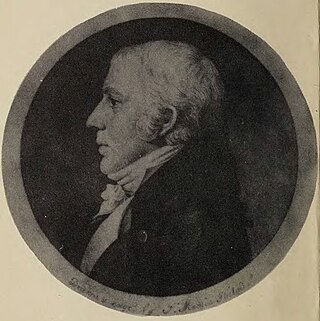
George Gray (1725–1800) served as a member of the Pennsylvania Provincial Assembly and as its Speaker in 1783.

The following outline is provided as an overview of and topical guide to the United States Commonwealth of Pennsylvania:
The following is a timeline of the history of the city of Philadelphia, Pennsylvania.


















